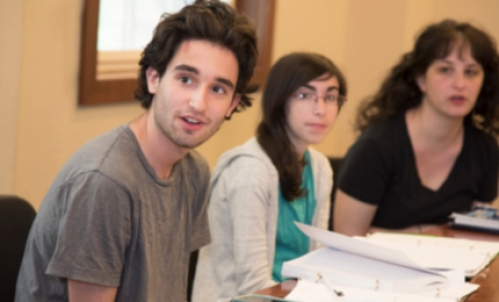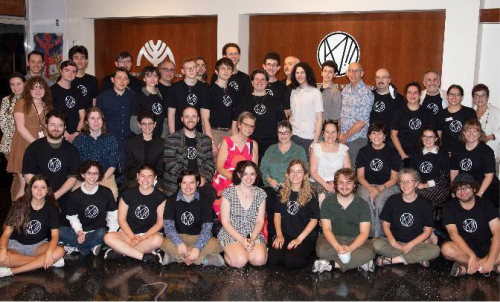2025 Online Course Listings
Language & Literature Classes
Language & Literature classes meet Monday through Friday, 9:50am-11:10am (ET) / 11:40am-1:00pm (ET).
BEGINNER YIDDISH LANGUAGE (Online)
Nina Warnke
This course is for students who have a basic familiarity with reading and writing the alphabet and spelling conventions of Yiddish. The course will introduce students to a wide variety of everyday vocabulary (including family, professions, telling time, food, clothes, home and leisure time activities). It will cover the foundational grammatical patterns such as cases; present, past, and future tenses; constructions with modal verbs; forms of negation; prepositions; adjective forms in all three cases; word order; and dependent clauses. The course will work with both volumes of In eynem.
Students will engage in extensive speaking, writing, reading, and listening activities and are expected to do daily written homework.
MATERIALS FOR THE COURSE:
In eynem, Volumes I & II. Additional materials will be made available by the instructor.
DICTIONARIES:
Required: Bochner/Beinfeld, Comprehensive Yiddish-English Dictionary (verterbukh.org) and Schaechter-Viswanath/Glasser, Comprehensive English-Yiddish Dictionary (englishyiddishdictionary.com). (Students will have free digital access to both for the duration of the program.)
BEGINNER YIDDISH LITERATURE (Online)
Vera Szabó
In this course, students will build vocabulary and develop their reading, writing, and comprehension skills. They will be introduced to modern Yiddish culture and literature by reading and discussing texts from various genres: readings from school textbooks, folktales, poetry, songs, and short stories. Audio and video recordings will enhance the learning process. A course pack and other material will be posted on Canvas.
Students are expected to download and print the course pack and all other texts, prepare the readings before class, read out loud, and discuss the texts during class sessions. Written homework will also be assigned. Attendance and participation are essential.
MATERIALS FOR THE COURSE:
Course pack compiled by the instructor (students will have free digital access).
INTERMEDIATE YIDDISH LANGUAGE (Online)
Brukhe Lang
This course will be structured around a series of projects which will facilitate speaking and writing skills as students engage with a variety of readings and audio(visual) materials. Topics will include biography, recipes, and academic writing, and will seek to maximize language use in meaningful contexts in order to help students expand their vocabulary and improve their command of language structures while deepening their knowledge of Yiddish culture. The course will also include explicit study of grammar with the aim of consolidating students’ knowledge of basic Yiddish structure and building on it. We will begin with the final unit of YiddishPOP and study additional grammar topics according to the group’s needs.
MATERIALS FOR THE COURSE:
All texts and audiovisual material will be provided by the instructor (students will have free digital access).
INTERMEDIATE YIDDISH LITERATURE (Online)
Vera Szabó
In this course, students will explore a wide range of literary and non-literary texts in Yiddish from various genres, geographic areas, and periods: folklore (proverbs, folksongs, folktales), short stories, poems, memoirs, diaries, journalistic texts, and more. Written and oral vocabulary and story-telling exercises will enhance students' Yiddish proficiency in speaking, reading, and writing. Audio and audiovisual materials will enrich the learning process.
Students are expected to download and print all texts, prepare the readings before class, read out loud, and share their opinions both in writing and by participating in classroom discussions. Attendance and participation are essential.
MATERIALS FOR THE COURSE:
All texts and audiovisual material will be provided by the instructor (students will have free digital access).
History & Culture Seminars
YIDDISH LITERATURE AND THE METROPOLIS (Online)
Marc Caplan
Tuesdays & Thursdays | 3:15pm-4:15pm (ET)
Class will be conducted in English, with some readings available in Yiddish.
Dovid Bergelson famously describes "three centers" for contemporary Yiddish culture in his 1926 essay by the same title: Warsaw, Moscow (which stands for the Soviet Union as a whole), and New York. Although his analysis overlooks several other cities where Yiddish was active – Buenos Aires, Tel Aviv, Odessa, Vilna (where the essay was published), and most conspicuously Berlin, the city in which he wrote it – what is remarkable about the premise of his essay is the argument that Yiddish culture was now centered in cities instead of in the shtetl (small town) where Yiddish had been located almost exclusively in the nineteenth century. This course will examine the phenomenon of migration from shtetl to city at the turn of the century and how Yiddish literature was transformed in the process. Among the writers to be considered in this survey are Y.L. Peretz, H.D. Nomberg, Salomea Perl, Lamed Shapiro, Moyshe-Leyb Halpern, A. Leyeles, Anna Margolin, Kadya Molodovsky, I.B. Singer, and Helen Londynski. Discussions in English; all materials available in Yiddish and English translation.
Electives
MOYSHE-LEYB HALPERN (1886-1932): "POET AND ANTI-POET" (Online)
Eugene Orenstein
Mondays | 5:00pm-6:00pm (ET) | June 30; July 7, 14, 21, 28
Class will be conducted in Yiddish. For students at the Advanced level.
Moyshe-Leyb Halpern is one of the greatest and most influential modern Yiddish poets. Upon his arrival in New York from Eastern Galicia in 1908, he joined the emerging Yiddish literary group "Di Yunge" [‘The Young Ones’]. But his hatred of "art for art's sake," his use of a conversational tone of daily speech, profanity and grotesque, his creation of numerous personae – including "Moyshe-Leyb" – to express different perspectives, and his shift towards expressionism distanced him from the core of the group and made him its most original and dynamic poet. This course will undertake a close reading of a number of his poems, in the context of the Yiddish literary scene and immigrant Jewish life of his time, in order to understand his significance in modern Yiddish literature.
משה־לײב האַלפּערן: פּאָעט און אַנטיפּאָעט
יודזשין אָרענשטיין
באַלד נאָך זײַן אָנקום קײן ניו־יאָרק פֿון מיזרח־גאַליציע אין 1908 האָט משה־לײב האַלפּערן זיך אָנגעשלאָסן אין דער שפּאָגל נײַער ייִדישער ליטעראַרישער גרופּע „די יונגע“. נאָר להיפּוך צו די װיכטיקסטע פֿאָרשטײער פֿון דער גרופּע האָט זײַן שׂינאה צום לאָזונג „קונסט לשם קונסט״, זײַן באַניץ פֿון דער טאָג־טעגלעכער שפּראַך און פֿון גראָבע רײד און זײַן נײגונג צו גראָטעסק און צום עקספּרעסיאָניזם אים דערװײַטערט פֿון דער גרופּע און אים געמאַכט פֿאַר דעם אָריגינעלסטן און דינאַמישסטן ייִדישן פּאָעט פֿון זײַן צײַט אין אַמעריקע. מיר װעלן זיך פֿאַרטיפֿן אין אַ צאָל פֿון זײַנע לידער כּדי צו פֿאַרשטײן זײַנע קינסטלערישע דערגרײכן אין דער מאָדערנער ייִדישער פּאָעזיע.
MENDELE: THREE NOVEL(LA)S (Online)
Joshua Price
Tuesdays | 4:30pm-5:30pm (ET) | June 24; July 1, 8
Open to all levels. Class will be conducted in English with some readings made available in Yiddish.
This seminar will offer a close reading of three novel(la)s of the so-called “Grandfather” of modern Yiddish literature, Sholem-Yankev Abramovitsh / Mendele Moykher-Sforim: Dos kleyne mentshele (The Little Man, 1864); Fishke der krumer (Fishke the Lame, 1869); Kitser masoes binyomen hashlishi (Brief Travels of Benjamin III, 1878). We will trace a double movement, stylistic and ideological, across these works: (1) the evolution of the fictional construct Mendele from the executor of a will to a full-on translator-author of a Quixotic shtetl adventure; and (2) the author Abramovitsh’s reckoning with the Haskole (East European Jewish Enlightenment) in a time of upheaval from within and without.
Readings and discussion in English; advanced students are welcome to read the Yiddish originals and bring insights to bear on our discussions. Bibliography of secondary sources will be provided.
DECIPHERING HANDRWITTEN YIDDISH MANUSCRIPTS (Online)
Eliezer Niborski
דעשיפֿרירן ייִדישע כּתבֿ־ידן
אליעזר ניבאָרסקי
מיטוואָך, 5:00–6:00 נ"מ, דעם 25סטן יוני; דעם 2טן, 9טן, 16טן, 23סטן און 30סטן יולי
במשך די זעקס באַגעגענישן וועלן מיר באַטראַכטן געשריבענע דאָקומענטן פֿון פֿאַרשיידענע צײַטן און סבֿיבֿות. דורכן דערקענען און באַשרײַבן אַ ריי כאַראַקטעריסטישע עלעמענטן אין יעדן טעקסט, וועלן מיר אָנקלײַבן די נייטיקע כּלים און טעכניקעס זיך צו פֿאַרמעסטן מיט אַ ברייטער גאַמע מאַטעריאַלן. דערבײַ וועלן מיר זיך אויך באַקענען מיט עטלעכע גרויסע אַרכיוון וואָס האַלטן זאַמלונגען ייִדישע כּתבֿ־ידן.
פֿון איין וואָך אויף דער צווייטער וועלן די אָנטייל־נעמער קריגן פֿאַרשיידענע פּראַקטיציר־ און צוגרייט־געניטונגען.
סטודענטן וואָס האָבן בײַ זיך געשריבענע דאָקומענטן מיט אַ היסטאָרישן, ליטעראַרישן צי אַפֿילו משפּחהדיקן אינטערעס און זענען בעלנים זיי צו באַאַרבעטן בחבֿרותא ווערן געמוטיקט זיך צו ווענדן מיט זיי צום לערער אין די ערשטע צוויי וואָכן פֿונעם קורס.
דער וואַרשטאַט ווערט געפֿירט נאָר אויף ייִדיש. ער איז פֿאָרויסגעזען פֿאַר סטודענטן פֿון די העכערע מדרגות, אָבער סטודענטן פֿון די מיטעלע קורסן מיט אַ שטאַרקער מאָטיווירונג מעגן אויך בײַזײַן און מיטהאַלטן.
RESEARCH METHODS WITH YIVO ARCHIVISTS (Online)
Staff of the YIVO Archives
Tuesdays | 4:30pm-5:30pm (ET) | July 15, 22, 29
Class will be conducted in English.
Archival Research at the YIVO Institute
This session will cover how to effectively navigate the YIVO Archives and Library. We will discuss the scope of the collections; optimizing catalog searches; accessing digitized materials for remote research; and the types of research assistance YIVO offers.
Online Tools for Yiddish Research
This session will introduce useful research tools, resources, and reference sources. The emphasis will be on sources that complement and help to contextualize materials found in the YIVO Archives.
Case Studies in YIVO Archives Research
This session will use actual inquiries from YIVO patrons to discuss the research process. Elective participants will be invited to submit their own research questions to be addressed during the session.
A WORLD OF YIDDISH SONG (Online and In-person)
Lorin Sklamberg, Eléonore Biezunski, and special guests
Fridays | 3:15pm-4:15pm (ET) | June 27; July 11, 18, 25
Class will be conducted in English.
Join Lorin Sklamberg and Eléonore Biezunski of YIVO’s renowned Sound Archive, as well as special guest presenters, to be immersed in the world of Yiddish song. In addition to traditional material from the collections of folklorist Ruth Rubin and from YIVO’s newly digitized Yiddish Folksong Project of the 1970s, the class will explore the rhymes of Jewish folk bards, the ecstasy of Hasidic chant, intimate love poetry, European cabaret, and contemporary hymns of protest. Various songs of love and loss, work and struggle, the innocence of childhood, and spiritual joy will be illustrated by rare source recordings drawn from YIVO’s Max and Frieda Weinstein Archive of YIVO Sound Recordings. Song texts will be provided in Yiddish, transliteration, English translation, as well as musical notation when available.

